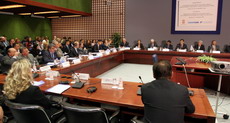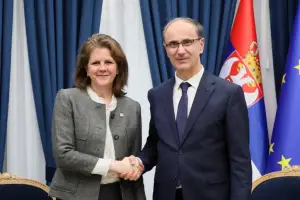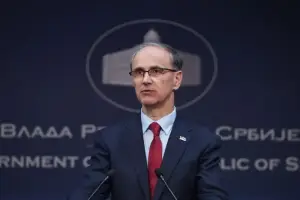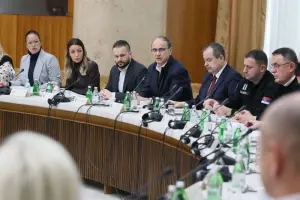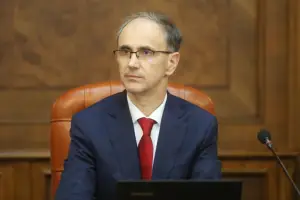Q:
A:
Rule of law – powerful obstacle to corruption
Belgrade,
20 September 2005
Serbian Prime Minister Vojislav Kostunica opened in Belgrade today a two-day conference on “Promoting incorporation of international anti-corruption standards into Serbian legislation.” The Serbian government’s official website brings Kostunica’s keynote address in full:
Ladies and gentlemen, dear guests,
On behalf of the Serbian government and on my personal behalf, I wish to greet all the participants in this conference, which is dedicated to promoting the harmonisation of Serbia’s legislation with international anti-corruption standards.
The rule of law has been the universal ideal of a civilised way of regulating public life in a society for centuries. Ever since first efforts to establish relations between people on the basis of justice and efficiency were made, they have all been moving within the framework of this ideal. To set rational standards for public behaviour and to ensure an efficient implementation of such standards – all this is contained in the expression “the rule of law.”
For the past five years, within the programme of its overall transformation, Serbia has written this expression in capital letters and has put it above other things. This has not happened for the first time in Serbia’s modern history, but it is the first time after decades of its existence in a system that did not care much about this ideal. Several generations lived a system in which government was not legally bound. For this reason the lives of people were unpredictable, or rather, dependent on good or ill will of rulers, individuals or the collective.
The October democratic changes five years ago promised legal certainty in everyday life – and the same went for doing business, public safety, and personal dignity. But then we were faced with serious difficulties of carrying out this goal on all levels of social life. We were faced with a general problem as to how to put the force and the power of public government into the framework of solid standards of public behaviour.
The rule of law is nothing but the building of public order, in a state as well as society. But not an “order” for people to fear but rather to enjoy it as their own, accepted and recognised set of general rules. Who is to pass such rules, what their content is to be like, and who is to guarantee that they are respected and efficiently implemented?
The answers to these questions contain the choice of one comprehensive constitutional system, which is being constantly built upon, changed, and perfected by a society. They contain the issues of building power – legislative, executive, administrative, and judicial – which is generally accepted on the part of citizens and efficient on the part of public officials. How to adopt a constitution, how to make sure that the parliament represents society, how to ensure control over government and public administration and, finally, the independence and efficiency of the judiciary? This is the set of questions before which Serbia stands today in a general effort to finally and irreversibly constitute itself as a legally established state of free people with a lawfully bound government.
It took a lot of time, even after the October changes, to realise that many reforms in the economy and society stood no chance unless there is a solid institutional framework capable of holding them together on a meaningful reform course. Mere production of laws is not enough unless there is a professional system of public administration to enforce and oversee them in real social relations. A judicial system is also much needed here, one that will enforce regulations without meddling by the executive power or another political influence and one that will prevent arbitrary interpretation by various powerful political, social, or economic elements.
On behalf of the Serbian government and on my personal behalf, I wish to greet all the participants in this conference, which is dedicated to promoting the harmonisation of Serbia’s legislation with international anti-corruption standards.
The rule of law has been the universal ideal of a civilised way of regulating public life in a society for centuries. Ever since first efforts to establish relations between people on the basis of justice and efficiency were made, they have all been moving within the framework of this ideal. To set rational standards for public behaviour and to ensure an efficient implementation of such standards – all this is contained in the expression “the rule of law.”
For the past five years, within the programme of its overall transformation, Serbia has written this expression in capital letters and has put it above other things. This has not happened for the first time in Serbia’s modern history, but it is the first time after decades of its existence in a system that did not care much about this ideal. Several generations lived a system in which government was not legally bound. For this reason the lives of people were unpredictable, or rather, dependent on good or ill will of rulers, individuals or the collective.
The October democratic changes five years ago promised legal certainty in everyday life – and the same went for doing business, public safety, and personal dignity. But then we were faced with serious difficulties of carrying out this goal on all levels of social life. We were faced with a general problem as to how to put the force and the power of public government into the framework of solid standards of public behaviour.
The rule of law is nothing but the building of public order, in a state as well as society. But not an “order” for people to fear but rather to enjoy it as their own, accepted and recognised set of general rules. Who is to pass such rules, what their content is to be like, and who is to guarantee that they are respected and efficiently implemented?
The answers to these questions contain the choice of one comprehensive constitutional system, which is being constantly built upon, changed, and perfected by a society. They contain the issues of building power – legislative, executive, administrative, and judicial – which is generally accepted on the part of citizens and efficient on the part of public officials. How to adopt a constitution, how to make sure that the parliament represents society, how to ensure control over government and public administration and, finally, the independence and efficiency of the judiciary? This is the set of questions before which Serbia stands today in a general effort to finally and irreversibly constitute itself as a legally established state of free people with a lawfully bound government.
It took a lot of time, even after the October changes, to realise that many reforms in the economy and society stood no chance unless there is a solid institutional framework capable of holding them together on a meaningful reform course. Mere production of laws is not enough unless there is a professional system of public administration to enforce and oversee them in real social relations. A judicial system is also much needed here, one that will enforce regulations without meddling by the executive power or another political influence and one that will prevent arbitrary interpretation by various powerful political, social, or economic elements.
Serbia is, therefore, these very months, in the process of reforming the public administration and judiciary in an effort to create reliable instruments to implement the law properly. If citizens notice that laws are not implemented, that they are openly violated, or undervalued by various powerful individuals, they will lose confidence in the rule of law and they will not be able to tell the difference between today and that time when the country was in a state of lawlessness. In that case, they will have nothing left but to seek solutions to their problems in the grey zone of fraud, bribery, and corruption.
These phenomena, well-known to our citizens, are nothing but a picture of our poor implementation of law, our lawlessness, or simply, the absence of the rule of law.
In addition to all the problems that Serbia faces today, Serbia must establish not only a system, but the tradition of the rule of law. The respect of law is not only an issue for state authorities and public officials, but an issue for all citizens. But state authorities and public officials must set the best example for the implementation of the rule of law, in order to make all citizens believe and accept the virtue of obeying the law.
We must not wait for difficult political problems to be solved, problems such as the Kosovo-Metohija solution, the problem of the state union, or the general stabilisation of our region, and then persistently begin putting in order our general public life. The solving of these difficult political questions, whose solving to some extent does not depend solely on us, also depends on the progress made in this second part. But if we cannot solve them ourselves, we will solve them easier if we establish inner peace, the calm of civil society, and the security of individuals. However, the realisation of these aims depends solely on us.
The modern time has shown that these aims are achievable only in a society that has a predictable order. And that is the order in which an individual knows in advance the legal framework of his actions and reliably depends on the order’s protection. Without these surroundings, Serbia does not have a peaceful future, nor a future in the union of European nations.
Therefore, our main aim is to organise Serbia from the inside by establishing strong democratic institutions and a law-abiding state. A law-abiding state requires rooting out corruption uncompromisingly, especially large-scale corruption, and it requires decisive confrontation with every attempt of evading and breaking the law without being punished, especially with those who believe they are untouchable. Briefly said, the rule of law is a powerful obstacle to corruption.
Respected friends, I would like to take this opportunity to briefly remind you that the Serbian government has adopted a large number of important laws without which the fight against corruption would simply be inconceivable. I would first of all single out the Law on preventing conflict of interest, as well as the National Strategy Against Corruption, which has been submitted to the Serbian parliament for adoption.
The Serbian parliament has also adopted a Strategy for public administration reform and based on this reform, submitted to the Serbian parliament a whole set of laws for adoption, which ought to provide a modern and European perspective to Serbia, an exemplary administration based on the principles of decentralisation, depolitisation, professionalisation and rationalisation.
It is, of course, necessary to further work in order to round off the normative framework and even more importantly, to enable its consistent and efficient implementation. Our aim is to secure in this process the full compliance of domestic laws with the UN Convention Against Corruption and with other UN conventions and acts, as well as with the Council of Europe’s conventions and recommendations.
I mentioned that the Serbian government has adopted a National Strategy Against Corruption. The Serbian state authorities, Council of Europe’s international experts, as well as experts from the Group of States against corruption (GRECO), took part in the Strategy’s drafting.
These phenomena, well-known to our citizens, are nothing but a picture of our poor implementation of law, our lawlessness, or simply, the absence of the rule of law.
In addition to all the problems that Serbia faces today, Serbia must establish not only a system, but the tradition of the rule of law. The respect of law is not only an issue for state authorities and public officials, but an issue for all citizens. But state authorities and public officials must set the best example for the implementation of the rule of law, in order to make all citizens believe and accept the virtue of obeying the law.
We must not wait for difficult political problems to be solved, problems such as the Kosovo-Metohija solution, the problem of the state union, or the general stabilisation of our region, and then persistently begin putting in order our general public life. The solving of these difficult political questions, whose solving to some extent does not depend solely on us, also depends on the progress made in this second part. But if we cannot solve them ourselves, we will solve them easier if we establish inner peace, the calm of civil society, and the security of individuals. However, the realisation of these aims depends solely on us.
The modern time has shown that these aims are achievable only in a society that has a predictable order. And that is the order in which an individual knows in advance the legal framework of his actions and reliably depends on the order’s protection. Without these surroundings, Serbia does not have a peaceful future, nor a future in the union of European nations.
Therefore, our main aim is to organise Serbia from the inside by establishing strong democratic institutions and a law-abiding state. A law-abiding state requires rooting out corruption uncompromisingly, especially large-scale corruption, and it requires decisive confrontation with every attempt of evading and breaking the law without being punished, especially with those who believe they are untouchable. Briefly said, the rule of law is a powerful obstacle to corruption.
Respected friends, I would like to take this opportunity to briefly remind you that the Serbian government has adopted a large number of important laws without which the fight against corruption would simply be inconceivable. I would first of all single out the Law on preventing conflict of interest, as well as the National Strategy Against Corruption, which has been submitted to the Serbian parliament for adoption.
The Serbian parliament has also adopted a Strategy for public administration reform and based on this reform, submitted to the Serbian parliament a whole set of laws for adoption, which ought to provide a modern and European perspective to Serbia, an exemplary administration based on the principles of decentralisation, depolitisation, professionalisation and rationalisation.
It is, of course, necessary to further work in order to round off the normative framework and even more importantly, to enable its consistent and efficient implementation. Our aim is to secure in this process the full compliance of domestic laws with the UN Convention Against Corruption and with other UN conventions and acts, as well as with the Council of Europe’s conventions and recommendations.
I mentioned that the Serbian government has adopted a National Strategy Against Corruption. The Serbian state authorities, Council of Europe’s international experts, as well as experts from the Group of States against corruption (GRECO), took part in the Strategy’s drafting.
The National Strategy’s main aim is to form and recommend measures that will in the following period contribute to the repression of corruption. The Strategy anticipates the adoption of several specific laws, the most significant being the Law on forming agencies against corruption, as a body that would control its implementation.
Several measures that would be implemented in the political system, the judiciary system, the police, the administration, in public financing, in the media and in the economic system, were defined. The Serbian government has accepted the responsibility to bring an action plan on the implementation of the National Strategy Against Corruption, as well as to provide necessary measures for the Strategy’s implementation.
We adopted these laws, of course, for them to be enforced, because only in this way can the rule of law be established. And as I already mentioned, the rule of law is a powerful obstacle to corruption. The time ahead of us will show more and more that the law must be above everyone and that a law-abiding state is imminently being established in Serbia.
Thank you for your attention.
Several measures that would be implemented in the political system, the judiciary system, the police, the administration, in public financing, in the media and in the economic system, were defined. The Serbian government has accepted the responsibility to bring an action plan on the implementation of the National Strategy Against Corruption, as well as to provide necessary measures for the Strategy’s implementation.
We adopted these laws, of course, for them to be enforced, because only in this way can the rule of law be established. And as I already mentioned, the rule of law is a powerful obstacle to corruption. The time ahead of us will show more and more that the law must be above everyone and that a law-abiding state is imminently being established in Serbia.
Thank you for your attention.



